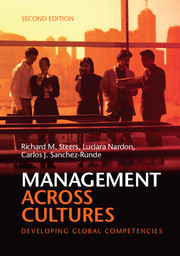Book contents
- Frontmatter
- Contents
- List of exhibits
- Guided Tour
- Introduction
- Part I Challenges for Global Managers
- 1 The new global realities
- 2 The new global managers
- Part II Developing Global Understanding
- Part III Developing Global Management Skills
- Appendix Models of national cultures
- Name and company index
- Subject index
- References
2 - The new global managers
from Part I - Challenges for Global Managers
- Frontmatter
- Contents
- List of exhibits
- Guided Tour
- Introduction
- Part I Challenges for Global Managers
- 1 The new global realities
- 2 The new global managers
- Part II Developing Global Understanding
- Part III Developing Global Management Skills
- Appendix Models of national cultures
- Name and company index
- Subject index
- References
Summary
Management challenge
As companies face an increasingly turbulent and complex global business environment, a logical question arises: can organizations today be managed in the same way they were in the past? In other words, does a changed environment – one characterized by multiple economic and political systems, divergent social norms and values, and highly diverse educational and skill levels – require us to reassess both the managerial role in general and management practices in particular? Indeed, is the very definition of management itself changing? Moreover, how should today’s managers best prepare themselves for greater involvement in global assignments in this new world? Key to success here will be their ability to develop new global management skills aimed at successfully doing business across cultures. To accomplish this, managers must first understand the role of continual on-the-job learning.
Chapter outline
▪ Traditional views of management page 32
▪ Rethinking managerial roles 34
▪ Culture and the managerial role 36
▪ Types of global assignments 43
▪ Developing global management skills 52
▪ Manager’s notebook: Learning strategies for global managers 57
▪ Summary points 61
Applications
2.1 Management trends: France and the United States 41
2.2 Expats at LG 45
2.3 Frequent flyer at Frog Design 48
2.4 Virtual manager in Delhi 50
2.5 Global training at Google 54
In a time of drastic change, it is the learners who will inherit the future. The learned usually find themselves prepared for a world that no longer exists.
Eric Hoffer Moral philosopher, United StatesWe don’t look so much at what and where people have studied, but rather at their drive, initiative, and cultural sensitivity.
Stephen Green Group chief executive officer (CEO), HSBC, United KingdomMany years ago a popular film making the rounds of the local movie theaters was If It’s Tuesday It Must Be Belgium. The film used humor to highlight the plight of a typical American tourist who was overcome by the cultural differences across the countries included in her whirlwind tour of Europe. The film’s underlying message was that tourists – at least, American tourists – seldom allow sufficient time in their travels to learn about cultural differences, preferring instead to race from one popular tourist site to another in search of good food, unique experiences, and photographs to show to their friends and family back home. The issue is one of having been there, not having learned anything. Today, despite a widespread recognition that we live and work in an increasingly interconnected global economy, it is curious that the dilemma posed in this old film is still salient for many contemporary managers and entrepreneurs alike. How serious are we about learning about other cultures? If we are serious, how do we accomplish this in meaningful ways as part of our busy work schedules?
- Type
- Chapter
- Information
- Management across CulturesDeveloping Global Competencies, pp. 30 - 64Publisher: Cambridge University PressPrint publication year: 2013



